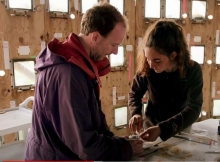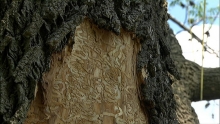« Depuis le début des années 2000, plusieurs acériculteurs expriment leur inquiétude relativement aux conséquences des changements climatiques sur leur industrie. « Ils se demandent si ce secteur restera viable tant du point de vue économique que de celui du processus de la coulée de sève, relate Benoît Côté, professeur agrégé et directeur des études graduées au Département des sciences des ressources naturelles de l’Université McGill. Ça m’a incité à me pencher sur cette question au début des années 2010.


Lorsque des agriculteurs demandent à l’agronome Joann Whalen comment réduire leurs émissions de gaz à effet de serre (GES), elle leur répond qu’il leur suffit de modifier certaines de leurs pratiques. « Il faut comprendre que les microorganismes du sol produisent naturellement des GES, explique-t-elle. Comme ces organismes ont besoin de carbone organique et d’azote (nitrates), on peut “jouer” sur la disponibilité de ces éléments pour diminuer leur activité et, par conséquent, sur les émissions de GES. »

NRS students and staff receive "Principal's Prize for Public Engagement" recognition
Kudos to FAES Science Communicators Allyson Menzies (PhD Candidate-NRS-Humphries), Marianne Falardeau-Côté (PhD Candidate-NRS-Bennett) and Emeritus Professor David M. Bird (NRS), who recently received well-deserved recognition from the Principal’s Prize for Public Engagement through Media.

What is the secret to longevity? Kyle Elliott (NRS) and Anne Mouillier (MSE) share clues to the aging process in the black-winged kittiwake in the debut of Aging in the Wild on this week's Nature of Things.

Que nous dit le Grand Nord sur notre climat, présent et passé? Isabelle Burgun s’entretient avec deux chercheurs : Marianne Falardeau-Côté, candidate au doctorat au département des sciences des ressources naturelles à l'Université McGill. Elle avait précédemment voyagé sur l’Amundsen dans le cadre de sa maîtrise.

Kyle Elliott (NRS), Canada Research Chair in Arctic Ecology is in Tianjin, China to participate in the Annual Meeting of the New Champions of the World Economic Forum (WEF). In 2017, Kyle was named by the WEF one of the best scientists in the world under the age of 40. The theme of this year’s meeting is the need for global collaboration in the 4th Industrial Revolution.
To humans, 31 miles may not seem like a very long distance to travel, but for a spider, it’s a long, long way to go. Emily Chung at the CBC reports on a new study that shows that since the 1960s, the northern black widow spider, Latrodectus variolus, has crawled that much further into Canada and may continue skittering northward as the climate changes.

McGill’s Sustainability experts [including Elena Bennett and Nil Basu] are involved in examining the effects of everything from locust swarms to urban heat islands to mountains of toxic e-waste. The new McGill Sustainability Systems Initiative hopes to play a crucial role in those efforts. #McGillNewsMag

Congratulations to Karina Benessaiah, Postdoctoral Researcher in the Department of Natural Resource Sciences, who received a prestigious Banting Fellowship.
While much of Quebec has been struggling under a withering heatwave, five McGill students have been recognized for their research based in cooler climes, namely the Arctic.

Tiny but destructive emerald ash borer beetles have infected thousands of trees across Montreal.... Jim Fyles, a McGill University professor of forest ecology and director of the Morgan Arboretum, said it's difficult to detect the tiny bugs.

It’s a question that has long plagued humanity: are we alone in the universe?
Scientists at McGill’s Macdonald campus are venturing towards a definitive answer with the development of a biosignature or life-detection platform.
...“There are some indications that Mars, many billions of years ago, was much warmer – and much wetter,” explained Lyle Whyte, a McGill professor. “Where it would have been an environment that we can envision it would have hosted life as we know on Earth.”
Conducting a bird census by foot can also be disruptive, David Bird, an emeritus professor of wildlife biology at McGill University, told Popular Science. “While you’re doing that, you’re disturbing the hell out of the birds,” Bird said.
City of Montreal will plant 40,000 saplings to replace trees that must be cut down
Thousands of ash trees infested by the tiny but destructive emerald ash borer will be cut down in Mount Royal Park by March 2019.
There are more than 10,000 ash trees in the park, and two-thirds have been treated against the invasive bug. The rest are getting axed.
Researchers demonstrate for the first time the potential of existing technology to directly detect and characterize life on Mars and other planets. The study, published in Frontiers in Microbiology, used miniaturized scientific instruments and new microbiology techniques to identify and examine microorganisms in the Canadian high Arctic - one of the closest analogs to Mars on Earth. By avoiding delays that come with having to return samples to a laboratory for analysis, the methodology could also be used on Earth to detect and identify pathogens during epidemics in remote areas.
